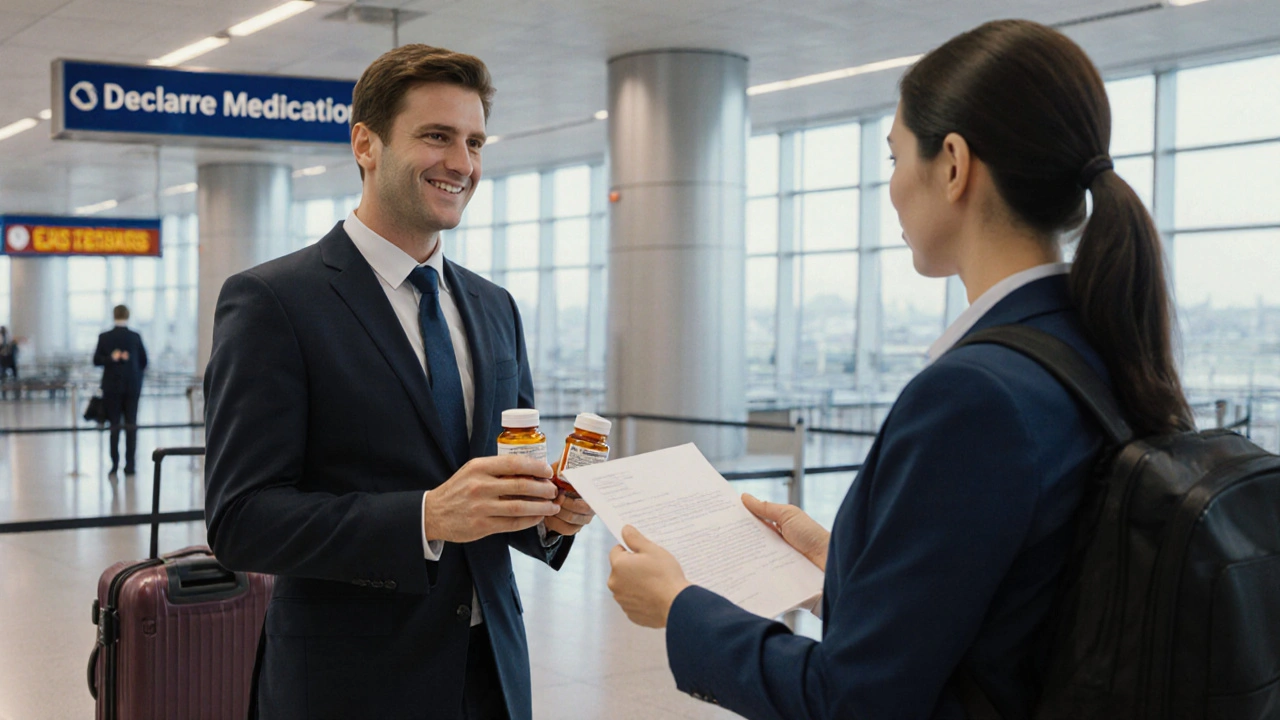Medication Travel Rules: What You Need to Know Before Flying with Pills
When you're traveling with medication, prescribed or over-the-counter drugs you rely on daily. Also known as traveling with prescriptions, it's not just about packing bottles—it's about following rules that vary by country, airline, and even airport security. Many people assume if it’s legal at home, it’s fine to carry on a plane. That’s not true. The TSA, U.S. Transportation Security Administration, the agency that screens passengers and baggage at U.S. airports allows most medications in carry-ons and checked bags, but they expect you to be ready to explain what you’re carrying. And if you’re flying internationally, foreign drug laws, the legal regulations around controlled substances in other countries can be strict—even deadly serious. Some common painkillers in the U.S. are banned in Japan. Sleep aids that are OTC in Florida might be classified as narcotics in Germany.
Here’s what actually matters: always keep your meds in their original labeled containers. No dumping pills into Ziplocs unless you have no other choice—and even then, bring a copy of your prescription. A doctor’s note helps, especially if you’re carrying injectables, large quantities, or controlled substances like opioids or ADHD meds. Airlines don’t care if your pills are in a pill organizer, but TSA agents might pull you aside if they can’t verify what they are. International travelers should check the U.S. Department of State, the federal agency that advises Americans on travel rules abroad website for each destination. Countries like the UAE, Singapore, and Australia have zero-tolerance policies for certain medications, even if they’re legal in the U.S. And don’t forget: liquids over 3.4 oz in carry-ons need to be declared, but medication is exempt from the 3-1-1 rule. You can bring more, but you have to tell the agent.
What you’ll find in the posts below are real answers from travelers who’ve been through this. How to handle insulin on a 14-hour flight. What to do if your prescription runs out overseas. Whether melatonin counts as a drug in Thailand. Why some people get stopped at customs with their anxiety meds. These aren’t theoretical guides—they’re stories from people who got it right, and those who didn’t. You’re not just reading rules—you’re learning how to avoid mistakes that could cost you your trip, your meds, or worse.
- September 20 2025
- 13 Comments
- Lucas Harrington
How to Travel Internationally with Prescription Medication
Traveling internationally with prescription medication requires planning. Know your meds' legal status, carry original packaging and a doctor’s letter, bring extra supply, and declare everything at customs to avoid fines or detention.
- Disney World Vacations (35)
- Kissimmee Florida (29)
- Florida travel (26)
- Crypto & Blockchain (10)
- Information & Privacy (5)
- Blockchain & Cryptocurrency (4)
- Disney Parks & Tips (3)
- Disney History (3)
- Travel (2)
- Travel Tips (2)
Categories
- January 2026 (6)
- December 2025 (29)
- November 2025 (41)
- October 2025 (16)
- September 2025 (6)
- August 2025 (3)
- July 2025 (3)
- June 2025 (2)
- May 2025 (2)
- April 2025 (1)
- March 2025 (6)
- February 2025 (11)
Archives
- Florida beaches
- Disney World
- Florida
- Florida travel
- Kissimmee demographics
- Kissimmee
- Kissimmee Florida
- Orlando tourism
- Disney park hours
- Disney World tips
- Disney vacations
- Disney 100
- theme park tips
- Disney celebration
- tourism
- Disney secrets
- Disney history
- travel
- Disney World crowd calendar
- Disney World cost

